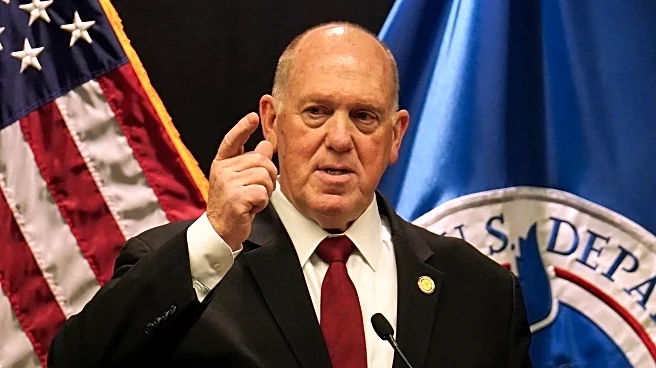What's Happening?
Dr. George Tidmarsh, the head of the Food and Drug Administration's drug center, resigned following an investigation into his personal conduct. Tidmarsh, who assumed the role in July, was placed on leave
after the Department of Health and Human Services' Office of General Counsel was alerted to concerns about his behavior. His resignation coincided with a lawsuit filed by Aurinia Pharmaceuticals, alleging Tidmarsh used his FDA position to pursue a vendetta against Kevin Tang, the company's board chair. The lawsuit claims Tidmarsh made defamatory statements about Aurinia's products, impacting the company's stock value. Tidmarsh's departure is part of broader leadership changes at the FDA, which has faced recent controversies and staff losses.
Why It's Important?
Tidmarsh's resignation highlights ongoing turmoil within the FDA, an agency critical to public health and safety. The allegations against Tidmarsh, if proven, could undermine trust in the FDA's impartiality and regulatory integrity. The lawsuit's claims of personal vendettas affecting regulatory decisions raise concerns about potential conflicts of interest within federal agencies. This situation may prompt calls for increased oversight and transparency in the FDA's operations, impacting how pharmaceutical companies interact with regulators. The broader implications for the FDA's leadership and its ability to effectively manage drug approvals and safety standards are significant, especially amid recent controversies.
What's Next?
The FDA will likely face increased scrutiny and pressure to restore confidence in its leadership and regulatory processes. The agency may need to implement reforms to prevent similar conflicts of interest and ensure ethical conduct among its officials. The lawsuit against Tidmarsh could lead to further legal proceedings, potentially revealing more about the internal dynamics at the FDA. Stakeholders, including pharmaceutical companies and public health advocates, will be watching closely for any changes in FDA policies or leadership appointments. The outcome of this situation could influence future regulatory practices and the agency's relationship with the pharmaceutical industry.
Beyond the Headlines
The case against Tidmarsh underscores the ethical challenges faced by regulatory bodies in balancing industry relationships with public health responsibilities. It raises questions about the influence of personal relationships on regulatory decisions and the need for robust checks and balances within federal agencies. The situation may also reflect broader issues within the FDA, including staffing challenges and the impact of political pressures on scientific decision-making. As the agency navigates these challenges, it must address the potential erosion of public trust and ensure its actions align with its mission to protect public health.









